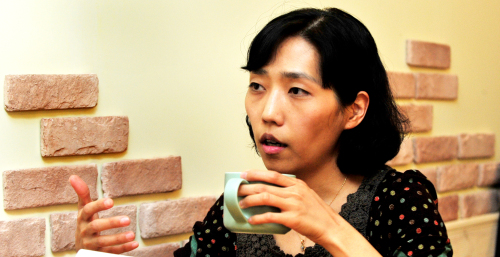Doctor-turned-filmmaker investigates Korean health care system
By Korea HeraldPublished : Dec. 5, 2011 - 17:45
Song Yoon-hee talks about making of Korea’s first medical documentary

Just three days ahead of the opening of her documentary debut, “White Jungle,” occupational environmental physician and filmmaker Song Yoon-hee seemed rather cynical.
“I hope the movie won’t get closed down by theaters too early,” she said.
Promoted as the local version of Michael Moore’s 2007 medical documentary “Sicko,” Song’s 9 million won budget indie film triggered much debate online even before its official release. The movie was said to be an expose on Korea’s health care system, which is, in Song’s words, “heavily exploited by the capitalist economy.”
Filled with sarcasm and even kitschy satire of political figures including President Lee Myung-bak and former Finance Minister Yoon Jeung-hyun, the movie, which opened Dec. 1, reveals how privatized hospitals in Korea solely focuses on profit-making without taking issues of welfare into their account.
On top of millions of won they spend on advertisements, each doctor is evaluated by the number of patients he sees and receives a bonus for each unnecessary, expensive medical examination -- preferably not those covered by national medical insurance -- they recommend. They receive an SMS whenever they are visited by a new patient, which tells them how many patients they’ve treated for the day.
The movie also reveals, via its hidden camera, that most patients get only an average of 30 seconds when consulting with a doctor.
The 32-year-old decided to shoot the film after her husband, who is also a doctor working for Ansan Medical Cooperative -- an Ansan, Gyeonggi Province-based healthcare organization that engages in social entrepreneurship, particularly known for their medical service for migrant workers -- told her about how one of his patients could no longer afford to pay for her diabetes treatment. Because she owned a house of her own, she was not eligible for government support. Yet she cannot afford pay for national health insurance, either.
“It’s a totally different experience,” Song told The Korea Herald. “I’ve heard and read about such cases countless times in newspapers and academic journals. But seeing someone leaving an emergency unit as a cadaver, because he could not pay for the treatment, is nothing like what you’d imagine from your readings.”
Song, who majored in Occupational and Environmental Medicine at Seoul National University’s graduate school, spent a great deal of her school years with the less fortunate who could not afford to pay their medical expanses. The 32-year-old completed her residency at Seoul Red Cross Hospital in 2006, where most patients are impoverished. She now works for Center for Health and Social Change, a medical research institute against the privatization of health care.
“I initially wanted to become a psychiatrist,” she told The Korea Herald. “It was fun to learn, and I’ve always liked to listen to other people. But later I realized I wanted to study something that’s connected to our society. And studying occupational and environmental medicine allowed me to do that.
“You would meet old women who work for 14 hours at kimchi factories. You naturally feel for the less fortunate. I think occupational and environmental physicians form less of a strong identity as doctors. It also involves meeting people and a lot of researching.”
Making the movie wasn’t always easy. Many did not reply to her e-mail inquiries for interviews. Some asked her if Song was ‘using’ them for the success of the movie. “A man, who was a patient, refused to do the interview saying I was using him for the project,” she said. “It hurt. He later called and told me he wanted to do the interview, because he wanted to help me. I went and made the interview a brief one.”
Song said her message is simple throughout: She is firmly against the privatization of health care. “It was shocking news, I didn’t know it was going to happen,” Song said on the recent passing of the FTA bill, which she thinks will eventually worsen health inequalities in the country. “It’s like you’ve created a set of small waves to make things better, and then a huge tsunami hits and sweep them all away. The movie doesn’t talk about FTA. But I’m willing to talk about it at screenings if any audience members have questions about it.”
Song, who has always been a movie lover, has been attending film workshops since she was 23. Having made two short fiction films since 2000 -- one about a middle-aged unemployed man and the other about the physically disabled -- Song is planning on making a feature film.
“It’s going to be the life of an elderly woman,” she said.
This is fifth in a series on up-and-coming Korean filmmakers. -- Ed.
By Claire Lee
(dyc@heraldcorp.com)
-
Articles by Korea Herald









![[Kim Seong-kon] Democracy and the future of South Korea](http://res.heraldm.com/phpwas/restmb_idxmake.php?idx=644&simg=/content/image/2024/04/16/20240416050802_0.jpg&u=)








![[KH Explains] Hyundai's full hybrid edge to pay off amid slow transition to pure EVs](http://res.heraldm.com/phpwas/restmb_idxmake.php?idx=652&simg=/content/image/2024/04/18/20240418050645_0.jpg&u=20240418181020)

![[Today’s K-pop] Zico drops snippet of collaboration with Jennie](http://res.heraldm.com/phpwas/restmb_idxmake.php?idx=642&simg=/content/image/2024/04/18/20240418050702_0.jpg&u=)